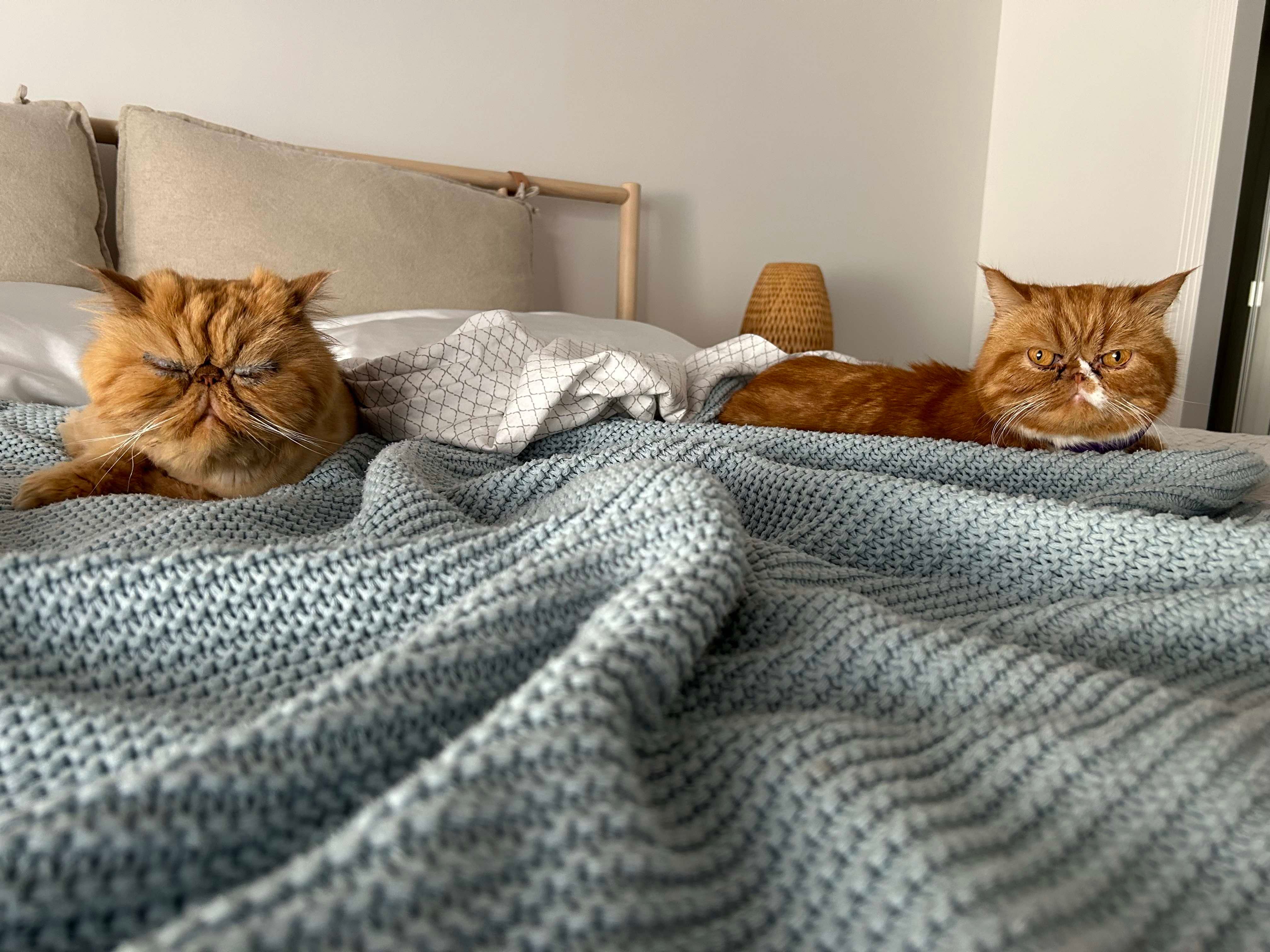In early January 2023, I welcomed Oliver, affectionately known as Ollie, into my home. He was a beautiful bicolor orange and white exotic shorthair cat in need of a new home. I thought he and my other cat, Bombom, even looked related with their flat faces and ginger coloring. Ollie's previous owners had declawed him. They didn't explain why, but they mentioned that he liked to stay low to the ground. I suspect this was due to the pain in his paws from the declawing procedure.
Ollie showed surprising confidence during the introduction period, not wanting to be confined and roaming about the house. He and Bombom maintained a respectful distance, with no extreme aggression. Bombom would occasionally attempt to play with Ollie.

After a couple of weeks, I noticed the smell of cat urine around the sofa. Shortly after, I witnessed a heartbreaking scene: Ollie attempting to urinate on the sofa while screaming in agony. I had never experienced anything like this before, nor had I ever seen a cat in such visible pain. We rushed to the vet immediately.
The vet informed us that Ollie was blocked and needed catheterization, tests, and overnight observation. I was bewildered by the situation. Ollie's previous owners had mentioned that he had experienced crystals the previous November and was on a urinary kidney diet, which they had provided.
The next day, when I went to pick him up, the vet shared their findings. Surprisingly, they found no crystals or apparent cause for the blockage. However, they discovered that Ollie's urethra was extremely narrow and scarred, suggesting this wasn't his first catheterization. They diagnosed him with Feline Idiopathic Cystitis (FIC) and recommended a perineal urethrostomy (PU) - a surgery where the penis is removed to create a wider urinary opening. The estimated cost was around $10,000. Overwhelmed and uncertain, I declined the surgery, opting instead to try managing his condition at home with pain medication.
Seeking more information and support, I joined the Feline Lower Urinary Tract Disease (FLUTD) Facebook group. This community provided invaluable knowledge about Ollie's condition, including insights on PU surgeries, helpful supplements, dietary recommendations, and warning signs to watch for. Most importantly, it allowed me to read about others' experiences with this disease. Armed with this information, I quickly ordered recommended supplements and sought additional advice from the group.
I returned to the vet to request more medication based on the group's feedback. The vet reluctantly agreed but was hesitant about long-term pain management. They again mentioned the PU surgery and even offered to have a vet tech adopt Ollie. I wasn't ready to give up on him and declined both options.
I decided to transition both Ollie and Bombom to wet food. While Bombom adapted easily, Ollie preferred his dry kibble. I administered his supplements daily, but according to the FLUTD group, the prescribed pain medication dosage was too low. The vet was unwilling to increase the dose, and Ollie continued to struggle, often only producing small drops of urine.
Seeking alternative solutions, I took Ollie to a holistic vet. They noted his lack of self-grooming and overall poor condition, recommending herbal remedies. Unfortunately, these didn't seem to address his main issue - the pain while urinating.
A work trip forced me to leave both cats for a few days. Ollie's condition was unstable, but I had a sitter check on them at home, hoping he would be okay.
Sadly, Ollie's health deteriorated rapidly. He stopped eating, and I cut my trip short to return home. Upon arrival, I found him with a swollen belly, barely moving. Fearing the worst, I rushed him to the vet. They presented options: catheterization, hospitalization for PU surgery, or removing urine from his bladder with a needle. I chose the last option, despite the risks involved.
Tragically, about 20 minutes into the procedure, the vet informed me that Ollie was dying. His body had filled with toxins, and his organs were shutting down. They advised that the kindest action was to put him to sleep. With a heavy heart, I agreed, and Ollie passed away in my arms.
I had only three months with this sweet, loving being. Despite his pain, he always sought cuddles and enjoyed watching TV with me. As all cat owners know, whether it's three months or 20 years, losing a pet always feels too soon.
I've struggled with guilt, wondering if I should have given him to the vet tech or opted for the PU surgery, despite mixed reviews about its effectiveness. Although family and friends remind me that Ollie came to me already ill and that I did what I could, I still feel I could have done more.
For those dealing with FLUTD or FIC, I hope the FLUTD Facebook group can provide the support and information you need. I also hope you can find a vet willing to work collaboratively with you. This disease is challenging to manage, and its causes remain largely unknown. Some theories suggest that a dry food diet may contribute to the problem. I've also read that declawed cats, being more anxious, may be more prone to FLUTD or FIC. Interestingly, black and white male cats seem to have a slightly higher incidence of these conditions.
As of now, much about this disease remains a mystery. All we can do is try our hardest to keep our feline companions comfortable and supported through their struggles.
If you are dealing with similar issues, these resources could help you.
- 📰 The Nightmare That is Blocked Cats
- 📰 Cat Urinary Blockage Home Remedy
- 📰 Cat Urinary Tract Diseases: Cystitis, Urethral Obstruction, Urinary Tract Infection
- 📺 Feline Urethral Obstruction (FUO) | How to unblock a cat | VETgirl Veterinary CE Videos
- 📺 Ollie's story on youtube